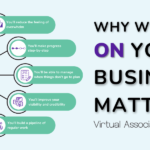
A big part of what will shape post-pandemic Britain will be how our cities and businesses recover, specifically if they will ever return to what we used to know. The daily commute, the watercooler moments, the pub drinks after work. Much of this will be dictated by individual organisations and what they believe is best for their workforce. However, whatever path an organisation goes down, not only does it need to be able to fulfil the needs of the business, it also has to prioritise employee wellbeing.
Since our founding in 2003, we have built the tools and technology needed to empower a remote workforce. LogMeIn has been at the centre of the remote work revolution that we have seen take place this year, due to the mass adoption of video conferencing software which has forced us to look inward and become examples of what organisations could look like post-pandemic.
The importance of employee feedback
Perhaps most important of all is making sure our employees are taking care of themselves and their families. Our employees’ mental health is just as important as their physical wellbeing.
As a part of this, we recently asked our employees where they want to work post-pandemic and the vast majority felt that a mostly remote work style was preferred. Given these answers and the benefits found with remote working, we anticipate that a very small percentage of our employee base will be in the office 5 days a week and globally most will come in just a few times a month.
Our staff not only felt they were more productive and had more time to spend with families and friends when working from home, they also felt the environmental impacts. Therefore, we have examined this new work paradigm and expanded our sustainability programmes in order to account for all employee work options. It’s clear to see that when we all switched to a more flexible remote working style there were key positive takeaways including emissions reductions and increased employee efficiency and engagement. Fewer cars on the road and aeroplanes in the skies led to cleaner air and, often, happier and more productive employees. The perception of what is possible when it comes to working from home has changed, increasing the number of virtual meetings, redefining face-to-face interactions, and reducing travel.
As part of this, we’ve developed “remote-centric personas” – an identifier that represents each working arrangement and the details and logistics that go with it, their expectations and how they would like to be engaged with given their work from home situation.
Reimagining offices
As we are hopefully moving towards seeing the back end of the pandemic, businesses all across the country are talking about going back into the office. But why would we just go back to “the way it was”? We need to start looking forward.
For us, offices will no longer be the place where we sit at desks and do solo work, rather, they will be used as a space for collaboration, when required. To facilitate this shift, we will give additional home office support and have a ‘collaboration’ budget set aside for team meetings and get togethers. This means our employees can think about relocating if it works for the employee and the business, no longer will they be limited to working in or near where their office is located. We can then start to reimagine where we have offices and what our offices look like. We won’t have the need for hundreds of desks in a building but can optimise the space for collaboration.
Now is the time
There are many reasons why it makes sense to move to a remote-centric workforce:
- Employees feel empowered with flexibility, improving their work-life balance and ensuring they do their best work from home
- Talent pool will now be broader and more diverse as we are not limited to hiring only where we have offices
- Office spaces or full company gatherings are used for collaboration, rather than a place where employees go every day
- Remote work will help to reduce our carbon footprint. Sustainability should be a focus in 2021 as we work to move towards a greener future.
The pandemic has surely sped things up a bit, but companies can no longer shun remote work. They need to realise its myriad of benefits including positive changes to employees’ mental health and wellbeing, cost savings and sustainability. We are in the midst of a sea change in how businesses operate, and at LogMeIn we look forward to a new, flexible future that benefits our employees, our community and our environment. Will others follow our lead?
By Sion Lewis, VP EMEA at LogMeIn
